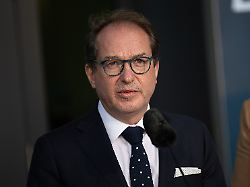Dobrindt wants a change of government
“Germany is at the tipping point”
October 20, 2023, 3:58 p.m
Markus Söder openly offers the Chancellor a new start together. Rumor has it that the first circles in the SPD and the Union have been discussing a “Germany Pact government” for days. The CSU leader in the Bundestag, Alexander Dobrindt, explains whether this is true and how it is intended.
ntv.de: Mr. Dobrindt, Markus Söder’s initiative sounds like a thunderbolt for the republic. How serious is the offer of a Germany Pact government?
Alexander Dobrindt: Very serious. Because the situation in Germany is extremely serious. The two most recent state elections seemed like a small federal election. The crash of the traffic light parties was brutal, the rise of the AfD was a beacon for our democracy. All democrats must now recognize that the situation in Germany has reached a political tipping point. If we don’t make a quick and consistent change in national policy now, we will be at risk of the AfD becoming the strongest party in the European elections. The republic is falling apart, partly because of the external catastrophes that are destabilizing us – and the population is expressing their bitter concerns in surveys and elections. All sensible people in Berlin across party lines feel this. Traffic light politicians are now saying it as openly as we from the CDU/CSU: The government cannot continue like this, otherwise we are endangering something very fundamental in Germany.
But the government gives the impression that it wants to continue. None of the traffic light parties are interested in the collapse of the coalition and new elections. So a break in the government is quite unlikely?
The Greens certainly want to hold on to this traffic light until the bitter end. The FDP is on the verge of desperation, sinking below the five percent mark and heading for open ruin with a view to the 2025 elections. But I don’t believe that Christian Lindner will take Otto Graf Lambsdorff’s 1981 step and present a second “concept for a policy to overcome weak growth.” But I would trust the SPD and the Federal Chancellor to be able to change something fundamental. The announcement of a Germany pact is a right step towards this. We have offered to work together to solve the migration crisis together and to stop illegal migration. The first conversations were constructive. Since then, the Chancellor has remained silent about it. We now need quick and big decisions. That won’t work with the Greens, but we would be willing to do it.
Of all people, the SPD should dare to restart?
The SPD is brash, but also a party with experience in power and government. Their leaders know that if they continue to muddle through the traffic lights, it is not just the right-wing populists who will continue to grow. The SPD is also threatened with historic damage with the traffic lights. The election results in Bavaria and Hesse are dramatic and a foretaste of what will happen next year in the European elections and the elections in the East.
Assuming the Chancellor takes the hand of the CSU, how would the CDU react to that? Are you really prepared to join a government under Chancellor Scholz?
First of all, we want the serious crisis in our republic, especially regarding the migration issue, to be resolved and substantial decisions to be made. And we also defend Germany as an industrial location together. The CDU and CSU extend a hand to the Chancellor on these questions. We therefore accepted his Germany Pact offer. Now is not the time for party political games. The situation is too serious for that. I also find Friedrich Merz to be highly responsible in this situation. If it serves the country, then we are willing to cooperate. Germany now urgently needs a new agenda for security and prosperity. Above all, the migration crisis is shaking our country to its core – there is an acute need for action here and the traffic light is unable to turn things around, especially because the Greens are blocking this issue. The SPD will therefore have to ask itself whether it wants to go under the millstone of the Greens and plunge the republic into a crisis.
Aren’t you exaggerating?
The migration crisis really cannot be postponed any longer. If the issue does not find a solution quickly, Germany will be fundamentally destabilized and tilt further and further to the right.
Wolfram Weimer spoke to Alexander Dobrindt
